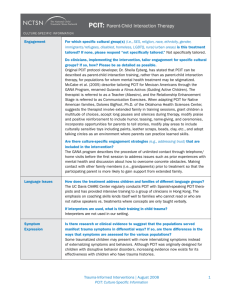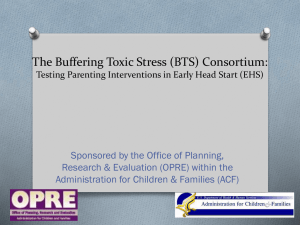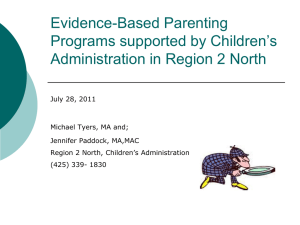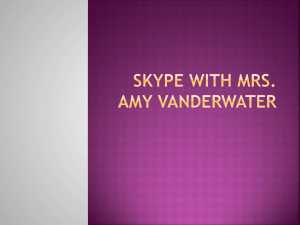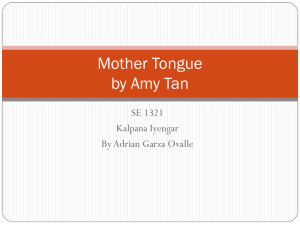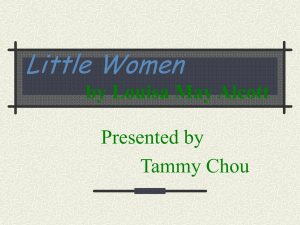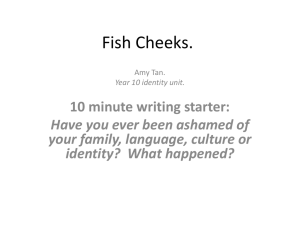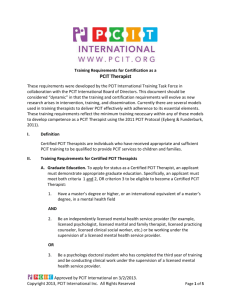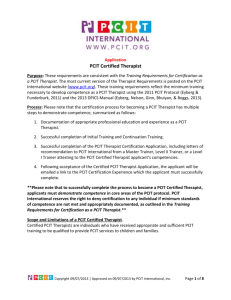Parent - Child Interaction Therapy
advertisement
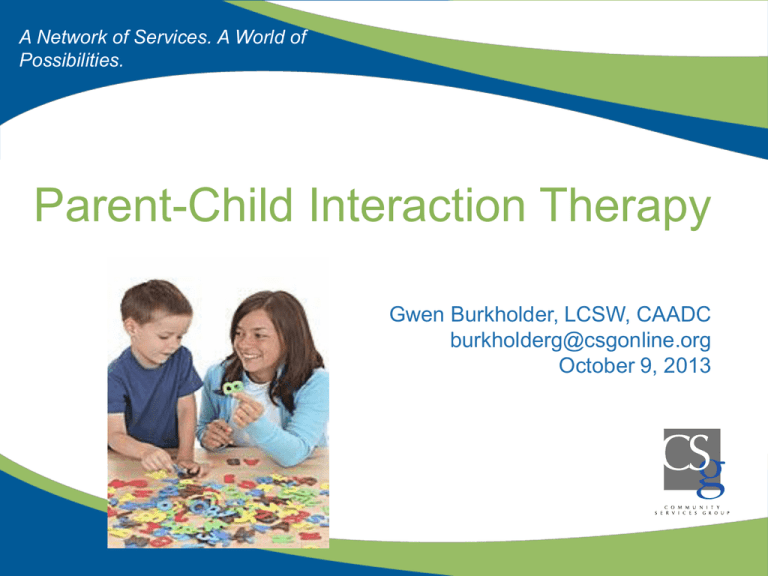
A Network of Services. A World of Possibilities. Parent-Child Interaction Therapy Gwen Burkholder, LCSW, CAADC burkholderg@csgonline.org October 9, 2013 Welcome and Introductions! Photos are courtesy of Amy Herschell, Ph.D. Thank you to the following people: • Cheryl Bodiford McNeil, Ph.D., Department of Psychology, West Virginia University, who provided my initial five-day training to become a PCIT clinician in November 2010 • Amy D. Herschell, Ph. D., University of Pittsburg School of Medicine, who has provided ongoing supervision and consultation to me regarding providing PCIT in Lancaster, PA over the past three years. What is PCIT? • Work with the parent (birth, kin, foster, adoptive) and child together • Designed to treat children age 2 to 7 years exhibiting disruptive behaviors • Use of coaching with a ‘bug-in-the-ear’ from a one-way mirror • Consists of two phases of treatment: – Relationship Enhancement – Behavior Management • Initially developed by Sheila Eyberg, University of Florida. McNeil, C.B., & Hembree-Kigin, T. (2010). Parent-Child Interaction Therapy. Second edition. New York: Springer. PCIT Set-up Photos are courtesy of Amy Herschell, Ph.D. What is PCIT? • Elements of family systems, social learning theory, and traditional play therapy • Emphasis on restructuring parent-child patterns, not modifying target behaviors • Parents are not blamed, but are given responsibility for improving the child's behavior • Program is completed in 12-20 sessions, depending on the needs of the family • Empirically evaluated in over 30 controlled studies McNeil, C.B., & Hembree-Kigin, T. (2010). Parent-Child Interaction Therapy. Second edition. New York: Springer. Critical Components of PCIT • • • • • • • • Parent and Child are seen together Relationship Focused Not Time Limited Coaching Model – Active, Directive Assessment Driven Scientifically Based Empirically Supported Clinically Validated Information provided by Amy Herschell, Ph. D. Who is PCIT Appropriate For? • Young Children (Age 2-7) • Children exhibiting externalizing behavior problems (e.g., verbal and physical aggression, defiance, noncompliance, temper tantrums) • Parents who could benefit from enhanced relationship and/or behavior management skills with young children Information provided by Amy Herschell, Ph. D. Who is PCIT Appropriate For? • Extensive contact with Primary Caregiver (or person completing PCIT with child) • Families with young children and who have experienced violence • Families with young children and relationship difficulties Information provided by Amy Herschell, Ph. D. Developmental Progression of Conduct Disordered Behaviors Oppositional Argues Stubborn Loud Offensive Cruelty Sulks Swears Aggressive Destroys Attacks Delinquent Sets fires Truancy Temper tantrums Demands attention Disobeys at home Bragging Teases Impulsive Disobeys at School Screams Poor peer relations Fights Lying/cheating Bad friends Threatens Others Steals at home Steals Outside/Home Alcohol/drug use Runs away Vandalism Information provided by Amy Herschell, Ph.D. Sample Course of Treatment Session Session Content Number Assessment of appropriateness for PCIT 1 Child Directed Interaction/Relationship Enhancement Skills Teaching Session 2-9 Coaching in Child Directed Interaction/Relationship Enhancement Skills 10 Parent Directed Interaction/Discipline Skills Teaching Session 11-19 Coaching in Parent Directed Interaction/Discipline Skills 20 Graduation Session Information provided by Amy Herschell, Ph. D. Assessment of Appropriateness for PCIT – Intake Process Agency Intake Supplemental PCIT Questions Standardized, self-report measures – Eyberg Child Behavior Inventory (ECBI) – Sutter-Eyberg Student Behavior Inventory (SESBI-R) – Child Behavior Checklist (CBCL) – Parenting Stress Inventory – Short Form (PSI-SF) Standardized, behavior observation measure – Dyadic Parent-Child Interaction Coding System-IV (DPICS-IV) Information provided by Amy Herschell, Ph. D. Eyberg Child Behavior Inventory (ECBI) • Assesses behaviors associated with the primary childhood disruptive behavior disorders (e.g., noncompliance, defiance, aggression) • Appropriate for children aged 2-16 years • Contains 36 items and two scales – the Intensity and Problem Scales • 10 Minutes for parents to complete, 2 minutes to score Information provided by Amy Herschell, Ph. D. Child Behavior Checklist (CBCL) • Survey social competencies and problem behaviors • Complete by parent or regular caregiver • Separate forms for two age groups (1.5 – 5 years & 618 years) • Approximately 100 items, 15 to 25 minutes to administer • Comprised of two broad band scales and a total problem scale – • Externalizing – disruptive or under controlled behaviors • Internalizing – anxiety, depression, withdrawal • Total problems scale Information provided by Amy Herschell, Ph. D. Parenting Stress Index (PSI)-Short Form • Composed of three subscales: – Parental Distress – Dysfunctional Parent-Child Interaction – Difficult Child Characteristics • Added together, these subscales yield a Total Stress Score Information provided by Amy Herschell, Ph. D. Dyadic Parent-Child Interaction Coding System (DPICS) • Structured observational assessment • Child-directed play • Parent-directed play • Clean-up • Observing and coding parent-child interactions for PCIT specific Skills • Labeled Praise, Behavioral Descriptions, Reflections • Questions, Commands, Criticism Information provided by Amy Herschell, Ph. D. Recognition as an Evidence-Based Practice Closing the Quality Chasm in Child Abuse Treatment: Identifying and Disseminating Best Practices (Chadwick Center, 2004) www.chadwickcenter.org/kauffman.htm The National Child Traumatic Stress Network (Empirically Supported Treatments and Promising Practices, supported by The Substance Abuse and Mental Health Services Administration, 2005) www.nctsn.org/nccts/nav.do?pid=ctr_top_trmnt_prom Child Physical and Sexual Abuse: Guidelines for Treatment (Saunders, Berliner, & Hanson, Eds., National Crime Victims Research and Treatment Center and The Center for Sexual Assault and Traumatic Stress; Office for Victims of Crime, U.S. Department of Justice, 2004) www.musc.edu/ncvc/resources_prof/OVC_guidelines04-26-04.pdf Evidence-Based Treatment for Children and Adolescents (The Society of Clinical Child and Adolescent Psychology, a division of the American Psychological Association, and the Network on Youth and Mental Health) www.effectivechildtherapy.com Youth Violence: A Report of the Surgeon General (Elliott, Hatot, & Sirovatka, Eds., U.S. Department of Health and Human Services, 2001) http://www.surgeongeneral.gov/library/youthviolence The California Evidence-Based Clearinghouse for Child Welfare (2006) www.cachildwelfareclearinghouse.org Information provided by Amy Herschell, Ph. D. Kauffman Best Practices Project (2004) Identified Three “Best Practices” for Children who have experienced abuse and are experiencing mental health concerns: • Abuse-Focused CBT • Parent-Child Interaction Therapy • Trauma-Focused CBT Information provided by Amy Herschell, Ph. D. Key Research Areas • • • • • • • • • Efficacy/Effectiveness Diagnostic Classifications Child Maltreatment Populations Cultural Variables Therapist Variables Treatment Delivery Attrition Maintenance Dissemination Information provided by Amy Herschell, Ph.D. Treatment Outcome Research with Children Experiencing Behavior Problems Main Findings: Parent skill increases in reflective listening, physical proximity, and prosocial verbalizations Decreases in sarcasm and criticism of the child More positive parental attitudes toward child Parent report of child behavior problems to within normal limits Parent self-reported improvements in psychopathology, personal distress, and parenting locus of control High consumer satisfaction with process and outcome Maintenance of treatment gains up to 6 years posttreatment Generalization to untreated siblings Generalization to home and school Herschell, A. D., Calzada, E. J., Eyberg, S. M., & McNeil, C. B. (2002). Research Issues In Parent-Child Interaction Therapy. Cognitive & Behavioral Practice, 9. Studies that have demonstrated PCIT’s Effectiveness with Physical Abuse • Conceptual Stage – Urquiza & McNeil R21 Grant Submission (1995) – Urquiza & McNeil Conceptual Paper (1996) • Case Reports and Single Subject Designs – – – – – Borrego, Urquiza, Rasmussen, & Zebell (1999) Fillcheck, McNeil, Herschell (in press) Fricker, Ruggiero, & Smith (2005) Herschell, Calzada, Eyberg, & McNeil (2002) Urquiza, Timmer, Herschell, McGrath, Zebell, & Porter (2005) • Treatment Outcome Studies – Chaffin and colleages (2007, 2010) – Urquiza, Timmer, Zebell, & McGrath (in press) – McNeil, Herschell, Gurwitch, & Clemens-Mowrer (2005) Information provided by Amy Herschell, Ph. D. Limitations and Caveats • Focus on child behavioral problems, parenting skill, and changing relationships, not on all aspects of family (e.g., active substance abuse, parent psychopathology) • Continued need for coordination with other treatment/support agencies • Limited age range • Parent and child must have regular ongoing contact Information provided by Amy Herschell, Ph. D. Clinician Training in PCIT Training Requirements for Clinicians Master’s degree or higher in the mental health field Actively working with children and families. Licensed in his or her field or receive supervision from a licensed individual trained in PCIT. Training Program 40-hours of face-to-face contact with a PCIT trainer 4-6 months later a 2-day advanced live training Case Experience (at least 2 families, preferably 5) Regular (bi-weekly) consultation/Supervision over 1 year Skill review Information provided by Amy Herschell, Ph. D. Sample Course of Treatment Session Session Content Number Assessment of appropriateness for PCIT 1 Child Directed Interaction/Relationship Enhancement Skills Teaching Session 2-9 Coaching in Child Directed Interaction/Relationship Enhancement Skills 10 Parent Directed Interaction/Discipline Skills Teaching Session 11-19 Coaching in Parent Directed Interaction/Discipline Skills 20 Graduation Session Information provided by Amy Herschell, Ph. D. Child Directed Interaction In the effort to enhance the relationship between the parent and child, the therapist coaches the parent to do the behavioral and play therapy techniques of: •Reflecting what child says •Describing what child is doing •Giving specific praise for child’s positive behavior The parent is also coached to avoid doing questions, commands, and criticism and to ignore minor annoying behavior. Parent Directed Interaction • The therapist coaches the parent to gain increased compliance from the child by teaching how to give direct commands and how to follow-up with consistent consequences for non-compliance, as part of the behavioral and play therapy. Graduation Do two practice sessions of play with two siblings together Assign at least two Public Behavior practice outings Use PDI for House Rules Use PDI as necessary for running commands throughout the day Practice PDI for 2-4 carefully selected direct commands each day After special playtime, practice PDI in a 5-min clean-up situation Practice PDI in daily 5-10 min play situation at home Corresponds with the Parent-Child Interaction Therapy Protocol (2011 Edition) How PCIT has become more common in Pennyslvania • The Pennsylvania Department of Public Welfare and the Pennsylvania Keys in collaboration with the Heinz Foundation, solicited Requests for Applications for Licensed Outpatient Psychiatric Clinics to send clinical staff to be trained to do ParentChild Interaction Therapy beginning in 2010. Several cohorts of training groups have been trained since that time. 2011 Pennsylvania Agencies Providing Parent-Child Interaction Therapy 2012 Pennsylvania Agencies Providing Parent-Child Interaction Therapy 2013 Pennsylvania Agencies Providing Parent-Child Interaction Therapy Last Updated – September 20, 2012 Pennsylvania Agencies Providing Parent-Child Interaction Therapy (8/30/13) County Allegheny City Pittsburgh Agency Allegheny Children’s Initiative Glade Run Laughlin Center Family Resources of PA Matilda Theiss Child Development Center @ WPIC Private Practice The Melting Pot University of Pittsburgh/ Western Psychiatric Institute and Clinic Wesley Spectrum Women’s Center and Shelter Milestone, Inc. Armstrong Leechburg Family Counseling Center Butler Butler Family Services of Butler Health System Family Pathways Kids Count/Family Psychological Pennsylvania Agencies Providing Parent-Child Interaction Therapy (8/30/13) County City Agency Bedford/ Somerset Bedford Alternative Community Resource Program Berks Fleetwood Concern Counseling Reading Familicare Counseling Center Reading Behavioral Health Bucks Langhorne Penndel Mental Health Center Carbon/Monroe/ Pike Weissport Behavioral Health Associates Palmerton Carbon/Lehigh Intermediate Unit #21 - Behavioral Health Service Easton Colonial Intermediate Unit #20 Centre Philipsburg Cen-Clear Child Services Chester Phoenixville Devereux Community Services Coatsville Child Guidance Resource Centers Clearfield/ Jefferson DuBois Clearfield-Jefferson Community Mental Health Center, Inc. Crawford Meadville Counseling and Child Guidance Cumberland Carlisle NHS – The Steven’s Center Delaware Havertown Child Guidance Resource Centers Upland Crozer-Chester Medical Center Erie Safe Harbor Behavioral Health Erie Sarah A. Reed Children’s Center Pennsylvania Agencies Providing Parent-Child Interaction Therapy (8/30/13) County Fayette City Uniontown Agency Chestnut Ridge Counseling Services, Inc Connellsville Counseling Connellsville Stern Center for Developmental and Behavioral Health Franklin/Fulton Chambersburg Laurel Life Camp Hill Franklin Family Services Huntington/Mifflin/ Juniata Huntington Universal Community Behavioral Health (UCBH) Indiana White Family Psychological Associates Lehigh Easton Colonial Intermediate Unit #20 Lackawanna/ Susquehanna Scranton Friendship House Scranton Counseling Center Carbondale NHS – Northeastern PA Lancaster Lancaster Community Services Group, Inc Lawrence New Castle Human Services Center Luzerne/Wyoming Wilkes Barre Children's Service Center of Wyoming Valley Lycoming/Clinton Williamsport Community Services Group, Inc Mercer Hermitage Community Counseling Center Paoletta Counseling Northumberland Sunbury Northumberland County Counseling Services Pennsylvania Agencies Providing Parent-Child Interaction Therapy (8/30/13) Philadelphia Philadelphia Children’s Crisis Treatment Center Children’s Hospital of Philadelphia Presbyterian Children's Village Schuylkill Pottsville Professional Counseling, Consulting & Human Services The ReDCO group Venango Oil City Regional Counseling Center, Inc. Washington Fredericktown Centerville Clinic Westmoreland Greensburg FBR New Kensington FBR/AERI Making referrals for PCIT •Refer to a behavioral health agency in your area who is providing PCIT. •Consider offering PCIT at your community health center if space is available, and the necessary licensure and billing issues can be worked out for the provision of behavioral health care on site. Recommended books on PCIT Available on www.pcit.org Available on Amazon.com
